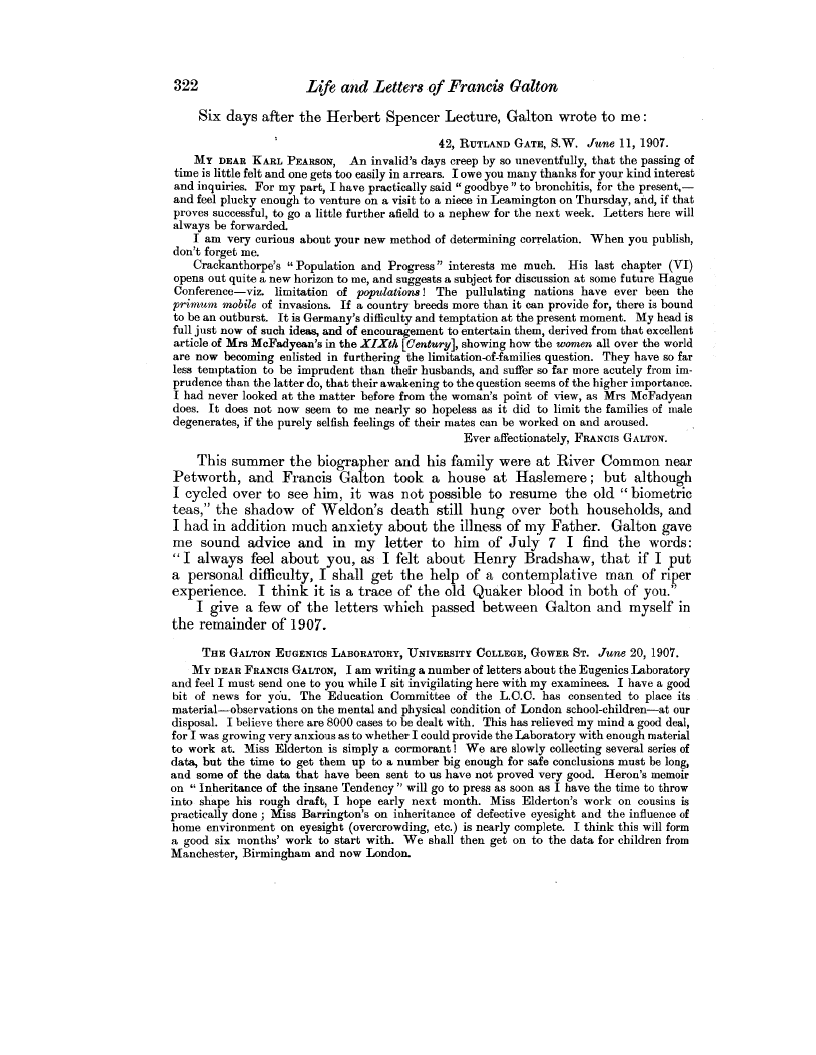| ||||||

OCR Rendition - approximate
322 Life and Letters of Francis Galton Six days after the Herbert Spencer Lecture, Galton wrote to me 42, RUTLAND GATE, S.W. June 11, 1907. MY DEAR KARL PEARSON, An invalid's days creep by so uneventfully, that the passing of time is little felt and one gets too easily in arrears. I owe you many thanks for your kind interest and inquiries. For my part, I have practically said " goodbye " to bronchitis, for the present,and feel plucky enough to venture on a visit to a niece in Leamington on Thursday, and, if that proves successful, to go a little further afield to a nephew for the next week. Letters here will always be forwarded. I am very curious about your new method of determining correlation. When you publish, don't forget me. Crackanthorpe's "Population and Progress" interests me much. His last chapter (VI) opens out quite a new horizon to me, and suggests a subject for discussion at some future Hague Conference-viz. limitation of populations ! The pullulating nations have ever been the primum mobile of invasions. If a country breeds more than it can provide for, there is bound to be an outburst. It is Germany's difficulty and temptation at the present moment. My head is full just now of such ideas, and of encouragement to entertain them, derived from that excellent article of Mrs McFadyean's in the XIXtha [Century], showing how the women all over the world are now becoming enlisted in furthering the limitation-of-families question. They have so far less temptation to be imprudent than their husbands, and suffer so far more acutely from imprudence than the latter do, that their awakening to the question seems of the higher importance. I had never looked at the matter before from the woman's point of view, as Mrs McFadyean does. It does not now seem to me nearly so hopeless as it did to limit the families of male degenerates, if the purely selfish feelings of their mates can be worked on and aroused. Ever affectionately, FRANCIS GALTON. This summer the biographer and his family were at River Common near Petworth, and Francis Galton took a house at Haslemere ; but although I cycled over to see him, it was not possible to resume the old " biometric teas," the shadow of Weldon's death still hung over both households, and I had in addition much anxiety about the illness of my Father. Galton gave me sound advice and in my letter to him of July 7 I find the words: " I always feel about you, as I felt about Henry Bradshaw, that if I put a personal difficulty, I shall get the help of a contemplative man of riper experience. I think it is a trace of the old Quaker blood in both of you." I give a few of the letters which passed between Galton and myself in the remainder of 1907. THE GALTON EUGENICS LABORATORY, UNIVERSITY COLLEGE, GOWER ST. June 20, 1907. MY DEAR FRANCIS GALTON, I am writing a number of letters about the Eugenics Laboratory and feel I must send one to you while I sit invigilating here with my examinees. I have a good bit of news for you. The Education Committee of the L.C.C. has consented to place its material-observations on the mental and physical condition of London school-children-at our disposal. I believe there are 8000 cases to be dealt with. This has relieved my mind a good deal, for I was growing very anxious as to whether I could provide the Laboratory with enough material to work at. Miss Elderton is simply a cormorant ! We are slowly collecting several series of data, but the time to get them up to a number big enough for safe conclusions must be long, and some of the data that have been sent to us have not proved very good. Heron's memoir on " Inheritance of the insane Tendency " will go to press as soon as I have the time to throw into shape his rough draft, I hope early next month. Miss Elderton's work on cousins is practically done ; Miss Barrington's on inheritance of defective eyesight and the influence of home environment on eyesight (overcrowding, etc.) is nearly complete. I think this will form a good six months' work to start with. We shall then get on to the data for children from Manchester, Birmingham and now London.
|